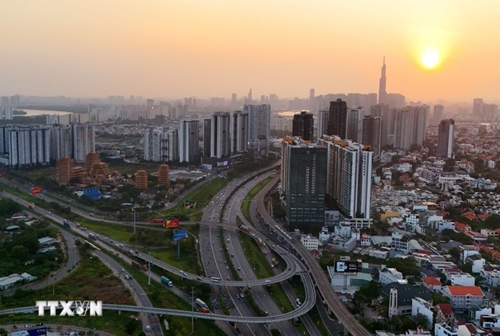In a recent interview with the Vietnam News Agency, Prof., Dr. Nguyen Xuan Thinh from the TU Dortmund University stressed that the country’s current standing is reflected not only in impressive socio-economic achievements but also in its active role in multilateral organizations such as ASEAN, the U.N., and Asia-Pacific Economic Cooperation (APEC). It is also expressed through engagement in new-generation trade frameworks like the Comprehensive and Progressive Agreement for Trans-Pacific Partnership (CPTPP), the E.U. – Vietnam Free Trade Agreement, and the Regional Comprehensive Economic Partnership (RCEP).
    |
 |
|
A view of Ho Chi Minh City |
Vietnam is no longer a follower but is gradually becoming a proactive partner that contributes its own voice to global issues, including peace, food security, climate change, and sustainable development, he said.
The progress, he emphasized, is rooted in the resilience, aspiration for rising up, and cultural strength of the Vietnamese people, which inspires overseas Vietnamese to contribute to their homeland's development.
Looking ahead, he noted that Vietnam is entering a new phase with the "four pillars" identified by the Politburo, namely strengthening the rule of law, advancing science and technology, deepening international integration, and unleashing private sector potential.
Amidst irreversible digital transformation and green transition, Vietnam must embrace new technologies like AI and big data, clean energy, biological technology and new materials, he said, highlighting the overseas Vietnamese could play a strategic bridging role, transferring knowledge and technologies and bringing global mindset and international standards to the homeland, contributing to a creative, green, and sustainable Vietnam.
While acknowledging Vietnam’s historic opportunities for breakthrough development, Thinh pointed out formidable challenges, including institution quality and enforcement capabilities, fierce global competition, science-technology gaps, geopolitical tensions, climate crisis, global supply chain shifts, and domestic reforms.
Most importantly, the professor emphasized the need to nurture a spirit of national service, especially among the youth, while encouraging contributions from the overseas Vietnamese community.
Looking back on the 80-year journey, it is a source of pride to see a resilient and stunning Vietnam rising on the global stage. However, the road ahead requires creativity and solidarity from the entire nation.
He expressed his belief that the Vietnamese community abroad, with patriotism, global knowledge, and connection to their roots, is indispensable in realizing Vietnam’s aspirations for a powerful, green, and sustainable future.
Source: VNA